Embodying Empathy
A version of this article originally appeared in the fall 2022 issue of STILLPOINT magazine.
From the full 26.2 miles to fun runs, marathon week in Boston means thousands of people are achieving meaningful, personal goals. For Cross Country alumna Keanna Smigliani ’21 (international affairs), a 5K charity run in April was not only a return from near-complete physical disability, but a symbol of overcoming trauma.
As Smigliani ran, she wasn’t thinking about getting a record time or a place on a podium. Instead, she thought of the incapacitated patients for whom she cares as a practice assistant in the Division of Trauma, Burn, Surgical Critical Care and Emergency General Surgery at Brigham and Women’s Hospital—a providential job after her own medical mystery was solved there.
Nearly overnight in 2019, a rare condition confined the lifelong athlete to bed and filled the proceeding years with excruciating pain, frightening symptoms and seemingly endless tests at hospitals. But before she was finally diagnosed with autonomic neuropathy/dysautonomia with preload failure and small fiber neuropathy, Smigliani encountered unexpected lessons on healing while studying abroad on the Balkans Semester for the Study of War and Peace.
The war victims who Smigliani met in Croatia often viewed their post-traumatic stress disorder as an affliction of the mind and body. “Any time people would talk about their trauma, they would describe it in a physical sense,” she says. “People’s bodies really absorb a lot.” Addressing conditions like PTSD, some found healing in physical, meditative practices like yoga.
The approach resonated with Smigliani, whose dysautonomia and neuropothy—a dysfunction of the nervous system that can be caused by physical trauma— may stem from the physical toll of the thousands of miles she has logged running. When she tried yoga for herself, Smigliani was amazed to find even more relief from physical symptoms like shaking and the inability to control her limbs.
Now equipped with a deeper understanding of how pain affects the whole body, Smigliani is discovering how her own experience of confronting and overcoming trauma has built empathy. “I think I’ve been given this gift of being able to carry really heavy burdens with a lot of grace,” she says.
“What intrigues me about trauma is how people heal from it—they take horrible things that have happened to them and turn them into something inspiring,” says Smigliani. “I want to bring together my experience as a patient and my experience understanding people with trauma. I have been the patient with trauma, and I still am the patient with trauma. I’m trying to be the person I wish I had on the other end of the phone.”
 The Bell
The Bell